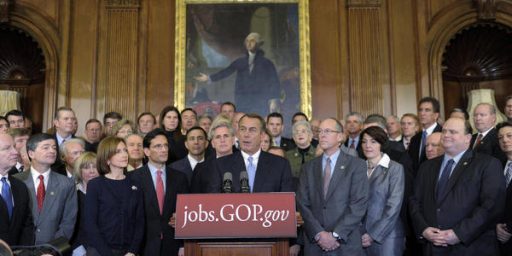Your Taxes Are Going Up
Annie Lowrey reminds us that our taxes will likely rise in January regardless of who wins the November election.
Annie Lowrey reminds us that our taxes will likely rise in January regardless of who wins the November election (hint: it’s probably going to be Obama).
Regardless of who wins the presidential election in November or what compromises Congress strikes in the lame-duck session to keep the economy from automatic tax increases and spending cuts, 160 million American wage earners will probably see their tax bills jump after Jan. 1.
That is when the temporary payroll tax holiday ends. Its expiration means less income in families’ pocketbooks — the tax increase would be about $95 billion in 2013 alone — at a time when the economy is little better than it was when the White House reached a deal on the tax break last year.
Independent analysts say that the expiration of the tax cut could shave as much as a percentage point off economic output in 2013, and cost the economy as many as one million jobs. That is because the typical American family had $1,000 in additional income from the lower tax.
But there is still little desire to make an extension part of the negotiations that are under way to avert the huge tax increases and across-the-board spending cuts, known as the fiscal cliff, that will start in January without a deal. For example, without any action, the Bush-era tax cuts will expire and the military and other domestic spending programs will be reduced.
“This has to be a temporary tax cut,” said Timothy F. Geithner, the Treasury secretary, testifying before the Senate Budget Committee this year and voicing the view of many in the White House and on Capitol Hill. “I don’t see any reason to consider supporting its extension.”
While the payroll tax is easily the most regressive of the federal taxes, it’s the easiest one to defend: it funds retirement benefits for those who pay into the system. Given that the Baby Boomers are already starting to retire, we can’t very well extend this tax break indefinitely.







The regressive ness, however, is not as easy to defend. And the particular spot that taxes stop being collected is entirely arbitrary. If we let the tax cuts expire, and raise the cap, there is no social security crisis at all.
It will hit me in the pocket book, but don’t worry, I’ll be ok.
Death and taxes.. unless you are rich and have lawyers that got your tax rate down to 14%, knowwhatimsayin?
@Gustopher: The payroll tax cut is not only defensible but morally compulsory if it’s a collection system for a capped benefits program that’s self-contained and self-financed. But, since the “trust fund” is completely notional and benefits are paid from the central treasury, it doesn’t make much sense. But to do away with the cap, you’d essentially have to do away with separate FICA collection and just roll it all into one pot.
James,
Yes, but it’s only the lower and middle classes who are concerned about FICA going up, since they pay more of it than income tax. And Romney has written them off, as part of the 47%.
We have historically large debt, and entitlement commitments.
We have historically low taxes.
Taxes have to go up. Spending has to go down.
The major Political Party enslaved by Grover Norquist either doesn’t get that…or is lying to you.
I think raising the cap for social security and medicare taxes makes more sense than raising the retirement age again.
While a lawyer or a doctor can probably work to 70 without age catching up to them, a man in the construction trades or similar labor intensive jobs is going to struggle. I also don’t think those working at the bottom end of the pay scale can afford to see these taxes increased much more than they already are.
@James Joyner:
I’m afraid I can’t make any sense of that. If the trust fund is “completely notional” then it can remain “completely notional” under any set of conditions. Period.
This is a good blog post. But shhhhh, we don’t want to talk about such items as regressive federal taxes. Not in an election year. Not when the working poor are being ginned up to vote in complete lock step for one particular candidate.
Speaking of regressive taxes, what about the tax on Social Security distributions? That’s a whopper. You get an entitlement benefit. Then they tax you on it. And talk about double taxation. First they tax you to fund other people’s retirements. Then when you retire they tax you again. While paying you back less than what you put in after inflation and opportunity costs are taken into account. And that’s for our generation. Gen. Y, the post-Millennials and whatever the next one, will be called won’t receive more than pennies on the dollar. Maybe a lot less.
So they tax you forwards and backwards. Going and coming. And the return is dog squat. Is there even an analogy for that sort of scheme? Hell, if a mutual fund tried something like that the government would shut it down.
In any case, taxes indeed will go up next year. If Obama wins they’ll go way up. The economy might already be in a recession, although the BEA’s reports might take a while to catch up. At best we’re looking at slow growth and a horrific job market. All part and parcel of the big slide.
@C. Clavin:
This is the recipe for recession.
@john personna: I think we can either keep pretending that Social Security is an insurance program wherein we’re paying for our own retirement or admit that it’s a social welfare program to ensure that the elderly have a means of subsistence. You can’t pretend it’s insurance but take far, far more money from people than they’re ever going to get back; you can do that if it’s just part of the tax system.
@James Joyner:
Let’s start with the idea that the trust fund represents a program-based accounting view. It is viable as that, though as you say it is a component of a wider US budget problem. It lets planners “black box” the system, and not throw up their hands, saying the whole thing is unknowable because the future US budget is unknowable.
Now given that modeling, you can look at required transfers into the system, or in the past, surpluses transferred out.
Well, if this actually depends on two factors, (a) how long people work, and (b) how long people live, then it looks a hell of a lot like an insurance system.
Remember, SS worked more easily when “a” and “b” were closer to equal.
(Note that I’ve long been a proponent of means-testing for SS, and that I’ve expected higher tax on SS as a back-door means test. It looks like both parties are moving towards that. Joe Biden Exposes Romney’s $460 Tax Increase on Social Security Benefits.)
Sure we can. The money put into a trust fund is entirely unrelated to what and by how much government taxes.
@john personna:
Heh. I read that as “Biden endorses” … wishful dsylexia
@john personna: Means testing on a program is just a way to destroy it, by creating a separate class of those who get the benefits and those who don’t.
Set the test to some high number, say $100,000 of income, and then slowly ratchet it down until it becomes a significant wedge.
Means testing doesn’t save significant money unless you deny social security benefits to a significant number of people. And, the administration required for means testing has not insubstantial costs.
Let’s see: taxes going up, gas prices still over $3 a gallon, food prices – going up like crazy, interest rates are lower but you can’t get a loan.
If there is any good news, I would like for someone to tell it to us.
@Gustopher:
One of my least favorite arguments is “everything is a slippery slope.”
Remember “criticism is censorship” … because “slippery slope?”
Or, we shouldn’t have speed limits because pretty soon they won’t let us drive at all?
No. Social Security has a single purpose and that is to protect the old. If they old are rich, they don’t need protection, they fall outside it’s moral mandate. That simple.
@john personna: You forget one fact: these peope have paid into the Social Security system for most of their lives. They are entitled, if anyone is, to their own money regardless of how much they are worth. If you want it that way, then people should be given choices and options about the Social Security system.
@James Joyner:
That’s semantics. The fact is, your FICA money doesn’t go into some trust fund that you access when you come of age. Payroll taxes are for the most part a transfer of wealth from workers to retirees.
To the extent that payroll taxes aren’t a transfer of wealth, you have to call it an insurance program that has a capped rate and benefit. If I treat this system as the latter, then I could maybe see how the payroll cap is defensible. But at it’s core we are fundamentally arguing that a social safety net that’s mostly for the poor and middle class, should be shouldered mostly by the poor and middle class… regardless of where the wealth in this country lies. That’s a tough proposition to swallow morally.
@Console: We’re not in disagreement on principle. What I’m arguing is that we’ve pretended, since the program’s inception, that Social Security is an insurance program, not a welfare program. So, we limit the payouts—thus the cap—and send checks to rich old people for whom cashing the check is probably more annoying than useful. But to means test it and uncap it would be to end the pretense. I’M OKAY WITH THAT. But the pretense has served a purpose all these decades: to make people who would otherwise not want government handouts to think that they’re actually just getting what they’re due, when in fact they get back what they put in, with interest, in very short order.
@Carson:
The problem here is that the average person gets more money out of social security and medicare than they put in. You can call it your money if you want, but the reality is that for the average person, “your money” will be only part of the benefits you get.
Counting social security alone, only very recently (like… this year) can the median retieree make the claim of getting less back than they put in.
@Console: As Alan Greenspan has remaked in his moments of lucidity, a nation controlling its own currency cannot fail to meet liabilities incurred in that currency. There’s never been an issue of taxes failing to meet payouts in Social Security or any other government liability. Money will always be there, the question is will there be sufficient goods and services (national productivity) to meet the standard of living we desire for our growing number of retirees. That is what we cannot know with certainty.
“I don’t see any reason to consider supporting its extension.” (Geithner). Well Mr. Geithner how about the fact that the working class people can’t take a $1000 cut in their pay, maybe you can, but not may or too many others. Get out into the real world and see what the people think. Evidently the Obama administration wants 99% of the people to be on food stamps.
I know it has to go back up, but wouldn’t it make more sense to bring it up gradually? It was cut by 2% (6.25% to 4.25%) so why not 0.5% a year for four years? That would blunt the impact.
@C. Clavin:
The question then is who wins and who loses if taxes go up at over $1 trillion just to fund current obiligation and even more taxes to fund growing and new entitlements. Why would anyone think about starting a new business when faced with the coming tax increases.
@Ben Wolf:
Cutting taxes and raising spending with no thought of how to pay the $16 trillion dollar debt in the future puts a country into financial meltdown. Just look at Greece to see what happens to a country where people get addicted to spending while refusing to pay the taxes required to fund all of the goodies.
The U.S. has to stop thinking in the short term about the economy and starting making changes for the long term. Trillion dollar annual deficits cannot be sustained forever and if inflation every increases, the $16 trillion dollar debt will become a huge drag on the economy.
@superdestroyer: Who is it you think needs to be paid back?
@James Joyner:
This raises an interesting point, and perhaps gets to the heart of a lot of our problems: the fact that people who do, in fact, receive public support don’t want to admit that they are receiving such support because they really don’t understand the policies in the first place (and so we get a profound misunderstanding of the the 47% and silly things like “keep government our of my Medicare”).
We have turned the word “welfare” into a bad word meaning, to most people, an unearned handout given to the unworthy instead of “the state of doing well especially in respect to good fortune, happiness, well-being, or prosperity”.
It is no wonder we have such a hard time debating these complex issues and why the default position of the politicians is to kick the can down the road.
@Mikey:
That’s one option. Another would be to tie it to some measurement of economic growth (UE numbers, GDP growth numbers).
The payroll tax cut is possibly the most stimulative tax cut available (state sales tax cuts maybe moreso?) because nearly everyone gets the cut, and many who do are, shall we say income-constrained. This is the last tax I’d want to raise back up. But I think we have to at some point.
Re: means testing: I’m fine with it in principle, but it will be yet another thing for well-off folks to whine about. I can barely contain my anticipation.
Regarding the deficit & debt, while I can’t bring myself to accept all of what Ben is saying (I’d like to and all, but that makes me extra doubtful), this:
Is silly, and needs to stop. We are not Greece.
@Rob in CT:
Well, in that case I think they’d have a point, in that they’ve paid into what is supposed to be a “social insurance” program (and if they are high-wage-earners they’ve paid quite a lot) and will be getting nothing out. What they get now may be chump change relative to their investment or other income sources, but they did pay into the system and are indeed entitled to a payout.
The solution to this is, as James Joyner has said, eliminating the fiction that Social Security is a social insurance program, and accept the reality that it’s actually a money transfer program. Then we just roll it straight into the overall tax system, and distribute a means-tested benefit to the elderly.
Of course, whatever party proposed such a change would cease to exist as a viable entity within microseconds…
Mikey,
I would prefer raising income cap on SS tax to means testing benefits, though it amounts to much the same thing.
People often pay for insurance and get nothing out. Many pay for auto insurance year in, year out, but never have a claim. Granted, people complain about that. SS is part of the safety net. A rich person has a non-zero chance of needing it. But in all likelyhood, will not.
So it *is* insurance. It’s also a welfare program. It’s dual-purpose. As for the idea of rolling it into everything else: fine by me. But as you say, it may be politically problematic.
@Rob in CT:
I’d be worried about the potential impact on sole proprietorships of going from 15.6% on the first $112K to 15.6% on everything. Another probable outcome would be the government collecting far less than anticipated because the sole proprietors start shuffling money around to avoid the extra bite.
But nobody sees it as a mere “safety net.” We’ve been told for 75 years that it’s something close to a sacred covenant; you pay into an account that has your unique number attached to it, and when you reach a certain age you can draw a regular payment from that account. It is your money. You are entitled to it.
The only way I see to make the necessary changes to the system is through a fundamental shift in perception, and doing that for 300 million people who’ve all grown up with what we currently have could prove insurmountable.
@Mikey:
Well, you could do a phase-out on the cap.
And it isn’t for most of us. It’s dual-purpose for most people. While I would survive without it, it will be a nice addition to my other investments. It’s only a “mere safety net” for very rich people.
We’ve been told for 75 years that it’s something close to a sacred covenant; you pay into an account that has your unique number attached to it, and when you reach a certain age you can draw a regular payment from that account. It is your money.
Apologies for screwing up my tags. I’m sure (if you’re still reading) you can figure out what I was trying to do. 😉
Increasing taxes or attempting to obtain additional revenues will not improve Social Security’s sustainability. There is no pool of savings, no place that funds are stored with which we provision the program. What the public understands as Social Security is nothing more than an accounting structure.
When you pay your payroll taxes you don’t send the government anything. The IRS and your bank alter the digits on a computer screen and reduce the size of your paycheck. There isn’t a money vault somewhere they dump dollars into to fund the program. People at Treasury go to their computers and input whatever quantity of dollars government desires into accounts to ensure payments to retirees. Increasing revenues will hace no impact whatsoever on that process.
@Rob in CT: Yeah, I figured it out, everyone has a “tag fail” sometimes.
I don’t think we should underestimate how the perception of what Social Security is makes it so difficult to institute any necessary change. Americans believe, most quite fervently, that the money is in an account and it’s theirs, despite neither being true. Any pol who tries to touch it gets crucified.
Medicare is a whole other level of horrifying. Right now it’s not as large a budget item as SS, but in 20-40 years, with the population aging…oh, man.